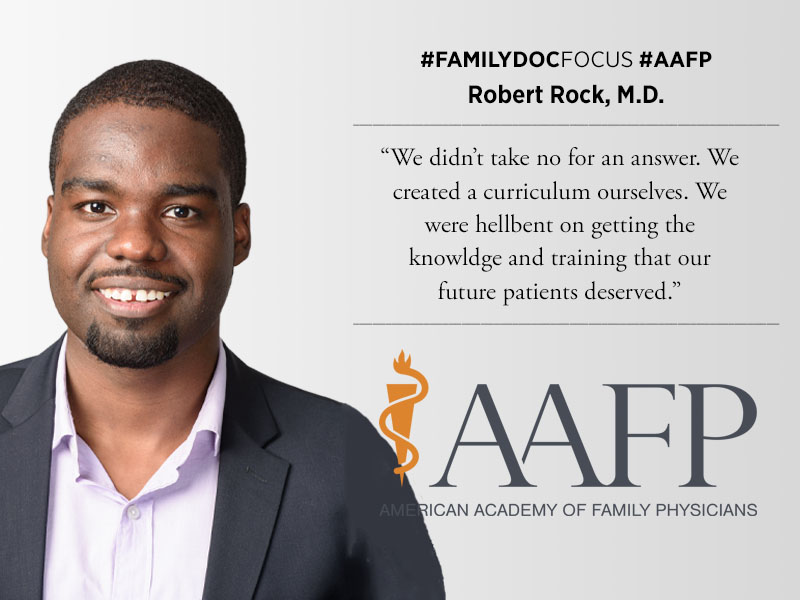Resident Has Passion for Health Justice
February 8, 2021, 3:58 pm David Mitchell — As a first-generation college student, Robert Rock, M.D., benefitted from New York’s Higher Education Opportunity Program on his road to becoming a family physician. He’s been working to help others ever since.

“It helped me get into college, afford it and graduate,” said Rock, the son of Haitian immigrants.
Rock entered New York University six weeks early with a cohort of other students with similar backgrounds in a program that offers financial assistance, counseling, tutoring and other support services.
“It was a great experience,” said Rock, a third-year family medicine resident at Montefiore Medical Center in the Bronx. “It was a super diverse group of overachievers. There was great mentoring, and it pushed me in terms of what I could get out of school.”
Rock earned good grades in high school but was “going through the motions” before he arrived at NYU, he said.
“In college, I started thinking about career trajectory, studying abroad, studying for the love of learning, throwing myself into student activities and taking advantage of all the opportunities in front of me,” he said.
The experience also gave him “a wicked case of imposter syndrome,” and he wasn’t alone.
“I saw a lot of bad coping skills,” he said.
Rock founded and led a program that paired freshmen and sophomores with junior and senior mentors.
“It helps people navigate all the things — good and bad — that come with the program and how to take advantage of it,” said Rock, who graduated cum laude from NYU with a Bachelor of Arts degree in art history. “It also created a sense of belonging.”
Rock had planned on a career in art or design, but that changed when his great-aunt Edele was diagnosed with late-stage uterine cancer. The family matriarch had been the first to immigrate to the United States, and her apartment in East New York, Brooklyn, became a starting place for those who followed, including Rock’s parents.
Language and cultural barriers delayed and complicated her care and left her feeling mistreated.
“She didn’t have a doctor,” Rock said. “She didn’t trust Western medicine. This was something that could have been caught early. Primary care would have sped up her ability to navigate the health care system. She decided to forgo care and died slowly. I watched that happen.”
Losing the woman who had helped raise him gave Rock a new direction.
“It made me feel selfish about art at the time,” he said. “How was I going to help people with art? My sense of purpose crystalized around that experience. It was happening over and over again in places like Brooklyn. I wanted to use medicine as a means to social justice for those who are marginalized in society.”
When Rock arrived at the Yale University School of Medicine in 2013, the institution lacked curriculum related to health justice. Undeterred, he worked with fellow Queens native Tehreem Rehman, M.D., M.P.H., to fill that gap.
“We didn’t take no for an answer,” Rock said. “We created a curriculum ourselves. We were hellbent on getting the knowledge and training that our future patients deserved.”
Rock and Rehman, now an emergency medicine resident in Oak Brook, Ill., developed an elective course on U.S. health justice. As part of that course, Rock drew on his background in art to create a gallery tour and reflection session that explores bias in Western culture and its impact on patient-clinician interactions. “Making the Invisible Visible” has become part of the required curriculum for Yale’s first-year medical students.
In 2018, the school introduced an annual award for student activism that honors Rock and Rehman.
Rock said he knew he wanted to work in primary care and population health, but he didn’t initially know that meant family medicine. At a school with no family medicine department or residency program, Rock said he did his own groundwork, and ultimately took an extra year to explore the specialty. That included spending time as a visiting scholar at the Robert Graham Center for Policy Studies in Family Medicine in Washington, D.C., and in a family medicine elective at Middlesex Hospital in Middletown, Conn.
“By the end of that year,” Rock said, “I knew this was what I wanted to do.”
Along the way, Rock has garnered a number of awards and honors, including being named a Pisacano Scholar and a 40 Under 40 Leader in Minority Health award from the National Minority Quality Forum, and receiving the Rising Star Award from the Josiah Macy Jr. Foundation for Excellence in Social Mission.
He will graduate from Montefiore this year, but he isn’t done with training. Rock will enter the two-year National Clinical Scholars Program this summer. His research will focus on institutional social accountability.
“We need to find a better way to incentivize academic medical institutions to support, ally and convene with the communities that host them in a way that moves needle on health equity,” he said.